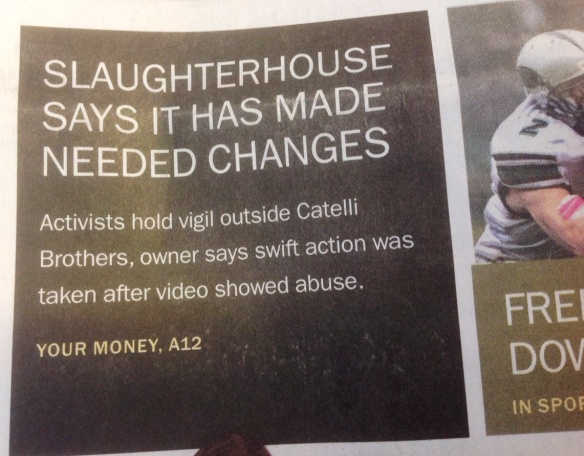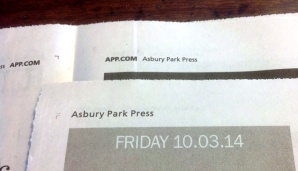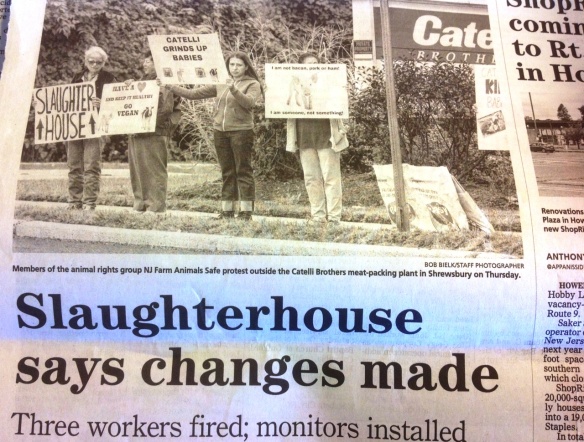Here’s a recent article headlined “Slaughterhouse Says Changes Made” by the Asbury Park Press, based in New Jersey, where the president of Catelli Brothers took “swift action” after an undercover video showed abuse of Holstein veal calves. Anthony Catelli is also quoted reassuring the public that the plant, in operation for 19 years so far, was designed to follow the humane slaughter methods developed by Professor Temple Grandin.

Three workers were fired, and eleven new cameras will watch the rest of them. Essentially, all that has changed is who monitors the employees.
“Ag-gag” bills—laws forbidding outsiders from recording workers in animal agribusiness—are receiving some attention because of their serious civil-rights implications. (Harold Brown and I will speak about such bills with criminal justice students at an open event in West Chester, Pennsylvania next week.) Far less noted is how undercover investigations become exposés of grotesque scenes that are, at best, met with a tidying-up of the system at a particular business. That hardly challenges an industry. Deliberate nastiness on the part of employees, after all, does nothing to preserve or augment the owners’ profits.
Moreover, undercover actions to expose abuses in a slaughter plant send the message that there’s nothing inherently abusive in killing. If the law is followed, there’s nothing for activists to find.
Another disturbing element involves the process by which the undercover videographer got this imagery. According to this story, the person filming on behalf of the Humane Society of the United States was more than a passive witness to the harrowing scenes recorded. HSUS spokesperson Mary Beth Sweetland says “our investigators do not participate in ill treatment of animals” and that the company, by stating otherwise, is throwing up smokescreens. In either case, HSUS sent an employee into a job at this animal processing plant to obtain images. Direct involvement in the handling and killing of animals can go on for weeks in some undercover projects.
What about the people who gathered in a public demonstration outside the slaughter plant? As the photo shows, they’re with a group named NJ Farm Animals Safe. At least one has a vegan placard. Good. A vegan shift is the only thing that’ll stop the production of Holstein veal calves. Of course, the protesters could be standing in front of countless places like this; a bust doesn’t need to happen for vegan outreach to be done. In any case, thanks to them for displaying the vegan message.
Last winter, the U.S. Department of Agriculture suspended operations at Catelli Brothers for five days after the Humane Society of the United States submitted evidence of violations of the Humane Methods of Slaughter Act of 1978, which, originally passed in 1958, was enacted to prevent needless suffering.
Even if it could be enforced throughout the country, the Humane Methods of Slaughter Act would have limited scope. The U.S. government and many States regulate the transport and slaughter of mammals in agribusiness, but few if any jurisdictions address breeding and husbandry in all other phases of the animals’ lives.
If, and only if, we stop buying dairy milk and cheese, the suffering stops. Nowadays I can point to vegan cheeses offering any taste or texture people might want, but let’s grow up. Good vegan cheese is a bonus for us. Not a need. And we needn’t be a society of bullies. The death of newborn animals so their parents can keep lactating to fill our breakfast bow ls is needless suffering.
ls is needless suffering.
How does this story conclude? Catelli Brothers was back in business within the week; the USDA closed the file; and since then, Anthony Catelli said, “there have been no issues whatsoever.”
Available: An online copy of the newspaper article.



So, can I now sleep through the night without nightmares waking me up? Is this the end that true animal advocates have worked so long and hard for? Is this, at last, the answer to our prayers? Cows, pigs, chickens, and other defenseless beings (commodities) hung upside down in the slaughter line, their throats slit open, their skin and limbs torn from their bodies, are at long last treated (bred, raised, murdered) “humanely?” Should I feel relieved and, indeed, grateful that rich and powerful organizations are fighting for the inherent “rights” of billions of enslaved animals? I’m still waiting for that good night’s sleep, still waiting for those nightmares to end. Still fighting the good fight.